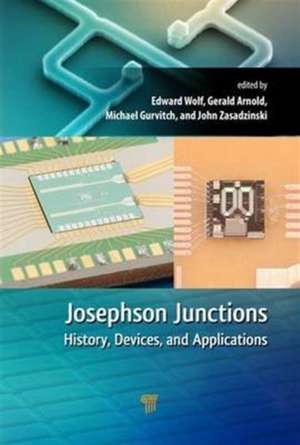Josephson Junctions: History, Devices, and Applications
Editat de Edward L. Wolf, Gerald B. Arnold, Michael A. Gurvitch, John F. Zasadzinskien Limba Engleză Hardback – 8 aug 2017
Preț: 547.86 lei
Preț vechi: 729.67 lei
-25% Nou
Puncte Express: 822
Preț estimativ în valută:
104.84€ • 109.96$ • 87.27£
104.84€ • 109.96$ • 87.27£
Comandă specială
Livrare economică 11-25 martie
Doresc să fiu notificat când acest titlu va fi disponibil:
Se trimite...
Preluare comenzi: 021 569.72.76
Specificații
ISBN-13: 9789814745475
ISBN-10: 9814745472
Pagini: 410
Ilustrații: 15 Illustrations, color; 106 Illustrations, black and white
Dimensiuni: 152 x 229 x 29 mm
Greutate: 0.8 kg
Ediția:1
Editura: Jenny Stanford Publishing
Colecția Jenny Stanford Publishing
ISBN-10: 9814745472
Pagini: 410
Ilustrații: 15 Illustrations, color; 106 Illustrations, black and white
Dimensiuni: 152 x 229 x 29 mm
Greutate: 0.8 kg
Ediția:1
Editura: Jenny Stanford Publishing
Colecția Jenny Stanford Publishing
Public țintă
Academic and PostgraduateCuprins
The Theoretical Discovery of the Josephson Effect. Introduction to Refractory Josephson Junctions. Tunnel Junctions on Niobium Using Aluminum: Experiment. Tunnel Junctions on Niobium Using Aluminum: Theory. The Trace That Launched a Thousand Chips: Development of Nb/Al-oxide-Nb Technology. Refractory Niobium Nitride NbN Josephson Junctions and Applications. Applications in Supeconducting SIS Mixers and Oscillators, toward Integrated Receivers. Application in Superconducting Quantum Interference Devices SQUIDs. Application in Adiabatic Quantum Annealing. Application to Josephson Voltage Standards.
Notă biografică
Wolf, Edward L.; Arnold, Gerald B.; Gurvitch, Michael A.; Zasadzinski, John F.
Descriere
This book summarizes the history and present status and applications of Josephson junctions. These devices are leading elements in superconducting electronics and provide state-of-the-art performance in detection of small magnetic fields and currents, in several digital computing methods, and in medical diagnostic devices and now provide voltage standards used worldwide. Astronomical infrared (IR) telescopes, including the South Pole Telescope, use these junctions in combinations called superconducting quantum interference devices (SQUIDs).
